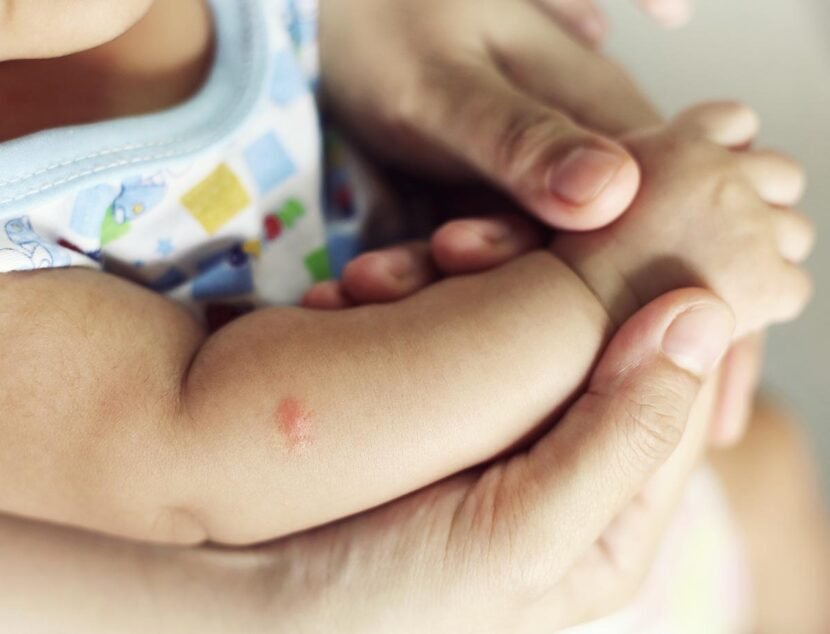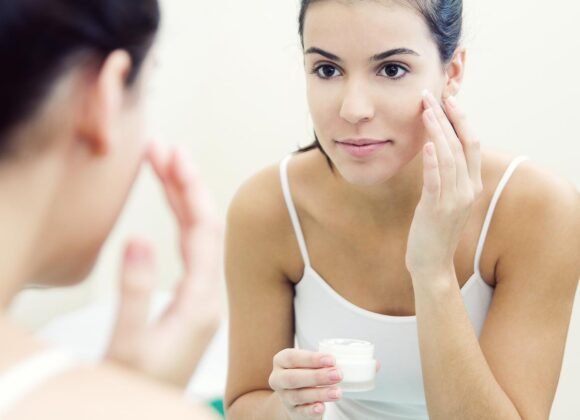Eczema, or atopic dermatitis, is a prevalent skin condition affecting infants and young children. It manifests as red, itchy, and inflamed skin, causing discomfort. Commonly occurring on the cheeks, scalp, and joints, eczema can appear anywhere on the body.
While the exact cause remains unclear, it is believed to result from a combination of genetic predisposition and environmental triggers. Children with a family history of eczema, asthma, or allergies are at higher risk. Environmental factors such as dry skin, irritants, and allergens can exacerbate the condition.
Managing eczema in babies and toddlers can be challenging due to the discomfort it causes. Parents and caregivers should be aware of common symptoms, including dry and scaly skin, red or inflamed patches, intense itching, and rough or leathery skin areas. Recognizing these signs enables early identification and appropriate treatment, providing relief for affected children.
Key Takeaways
- Eczema is a common skin condition in babies and toddlers, characterized by itchy and inflamed skin.
- Soothing itchy and irritated skin in babies and toddlers with eczema can be achieved through gentle skincare and avoiding triggers.
- Managing symptoms and preventing flare-ups of eczema in babies and toddlers may involve using moisturizers, avoiding irritants, and keeping the skin well-hydrated.
- Identifying triggers for eczema flare-ups in babies and toddlers can include allergens, irritants, and environmental factors.
- Gentle skincare for babies and toddlers with eczema involves using mild, fragrance-free products and keeping the skin moisturized.
- Natural remedies for eczema relief in babies and toddlers may include oatmeal baths, coconut oil, and chamomile tea compresses.
- Severe eczema symptoms in babies and toddlers may require professional help from a pediatrician or dermatologist for proper diagnosis and treatment.
Eczema Relief: Soothing Itchy and Irritated Skin
Moisturizing: The First Line of Defense
Using a gentle, fragrance-free moisturizer can help to soothe dry, itchy skin and prevent flare-ups. It is important to apply moisturizer regularly, especially after bathing, to lock in moisture and keep the skin hydrated.
Avoiding Irritants and Allergens
In addition to moisturizing the skin, it is important to avoid irritants and allergens that can trigger eczema flare-ups. This may include avoiding harsh soaps and detergents, using gentle laundry detergents, and keeping the baby’s environment free from dust mites and pet dander.
Additional Tips for Soothing Eczema
It is also important to dress the baby in soft, breathable fabrics such as cotton, and to avoid tight-fitting clothing that can further irritate the skin. For babies who are prone to scratching, it may be helpful to keep their nails short and to use soft cotton mittens or clothing with fold-over cuffs to prevent them from scratching their skin.
Eczema Treatment: Managing Symptoms and Preventing Flare-Ups
Managing the symptoms of eczema and preventing flare-ups is essential for providing relief for babies and toddlers with the condition. In addition to keeping the skin moisturized and avoiding irritants and allergens, there are other treatment options that can help manage eczema symptoms. In some cases, a pediatrician may recommend using over-the-counter or prescription topical corticosteroids to reduce inflammation and itching.
These medications should be used under the guidance of a healthcare professional, as they can have side effects if used improperly. Another treatment option for eczema is using topical calcineurin inhibitors, which are non-steroid medications that help reduce inflammation and itching. These medications are often used for children over the age of 2 and should be used under the guidance of a healthcare professional.
In some cases, oral antihistamines may be recommended to help relieve itching and improve sleep for babies and toddlers with eczema. It is important to consult with a pediatrician before using any medications to ensure they are safe and appropriate for the child’s age and condition.
Identifying Triggers for Eczema Flare-Ups in Babies and Toddlers
Identifying triggers for eczema flare-ups in babies and toddlers is an important step in managing the condition. Common triggers for eczema flare-ups include dry skin, irritants such as harsh soaps and detergents, allergens such as pet dander and dust mites, heat and sweat, and stress. By identifying these triggers, parents and caregivers can take steps to minimize their impact on the child’s skin and reduce the frequency of flare-ups.
One way to identify triggers for eczema flare-ups is to keep a diary of symptoms and potential triggers. This can help parents and caregivers track patterns and identify specific triggers that may be causing flare-ups. Additionally, it may be helpful to work with a pediatrician or dermatologist to conduct allergy testing to identify specific allergens that may be triggering eczema flare-ups in the child.
Once triggers have been identified, parents and caregivers can take steps to minimize their impact on the child’s skin, such as using gentle skincare products, keeping the environment free from allergens, and managing stress through relaxation techniques.
Gentle Skincare for Babies and Toddlers with Eczema
Gentle skincare is essential for babies and toddlers with eczema, as harsh products can further irritate the skin and trigger flare-ups. When caring for a child with eczema, it is important to use gentle, fragrance-free skincare products that are specifically formulated for sensitive skin. This includes using mild, non-drying cleansers that do not strip the skin of its natural oils, as well as fragrance-free moisturizers that help keep the skin hydrated.
When bathing a baby or toddler with eczema, it is important to use lukewarm water rather than hot water, as hot water can further dry out the skin. Additionally, it may be helpful to limit bath time to 10 minutes or less to prevent the skin from becoming too dry. After bathing, it is important to pat the skin dry gently with a soft towel rather than rubbing it, which can further irritate the skin.
Applying moisturizer immediately after bathing can help lock in moisture and keep the skin hydrated.
Natural Remedies for Eczema Relief in Babies and Toddlers
Natural Remedies for Eczema Relief
One natural remedy that has been found to be effective in relieving eczema symptoms is coconut oil. Coconut oil has moisturizing properties that can help soothe dry, itchy skin and reduce inflammation. Applying a thin layer of coconut oil to the affected areas of the skin can help provide relief for babies and toddlers with eczema.
Oatmeal Baths for Soothing Eczema
Another natural remedy for eczema relief is oatmeal baths. Oatmeal has anti-inflammatory properties that can help soothe irritated skin and reduce itching. Adding colloidal oatmeal to bathwater can help provide relief for babies and toddlers with eczema. It is important to ensure that the oatmeal is finely ground so that it dissolves easily in the water.
Post-Bath Care for Eczema Relief
After bathing in oatmeal water, it is important to pat the skin dry gently and apply moisturizer to lock in moisture. This can help provide long-lasting relief for babies and toddlers with eczema.
Seeking Professional Help for Severe Eczema Symptoms in Babies and Toddlers
While many cases of eczema can be managed at home with gentle skincare products and natural remedies, severe eczema symptoms may require professional help. If a baby or toddler’s eczema does not improve with at-home care or if it worsens despite treatment, it is important to seek help from a pediatrician or dermatologist. Severe eczema symptoms may include intense itching that disrupts sleep, oozing or crusting of the skin, signs of infection such as fever or pus-filled blisters, or widespread rash that does not improve with treatment.
A healthcare professional can provide a proper diagnosis of the severity of the eczema and recommend appropriate treatment options. This may include prescription medications such as topical corticosteroids or calcineurin inhibitors, as well as oral antihistamines or antibiotics if there are signs of infection. In some cases, a healthcare professional may recommend wet wrap therapy or phototherapy to help manage severe eczema symptoms.
By seeking professional help for severe eczema symptoms in babies and toddlers, parents can ensure that their little ones receive the care they need to manage the condition effectively. In conclusion, understanding eczema in babies and toddlers is essential for providing proper care and relief for the condition. By identifying triggers for flare-ups, using gentle skincare products, seeking professional help when needed, and exploring natural remedies for relief, parents and caregivers can help manage eczema symptoms effectively for their little ones.
With proper care and support, babies and toddlers with eczema can find relief from itching and discomfort, allowing them to thrive and enjoy a happy, healthy childhood.
FAQs
What is eczema?
Eczema is a common skin condition that causes red, itchy, and inflamed patches of skin. It can occur in people of all ages, including babies and toddlers.
What are the symptoms of eczema in babies and toddlers?
Symptoms of eczema in babies and toddlers may include red or brownish-gray patches on the skin, small raised bumps that may leak fluid when scratched, and intense itching.
How can I soothe eczema symptoms in babies and toddlers?
To soothe eczema symptoms in babies and toddlers, it is important to keep their skin moisturized, use mild soaps and detergents, dress them in soft, breathable fabrics, and avoid known triggers such as certain foods or environmental allergens.
When should I seek medical attention for my baby or toddler’s eczema?
If your baby or toddler’s eczema does not improve with at-home treatments, or if it becomes infected, it is important to seek medical attention from a healthcare professional. They can provide further guidance and treatment options.




